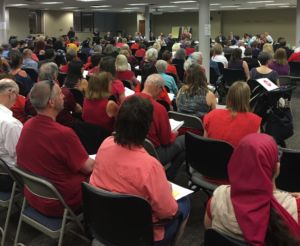MN Dept. of Education Approves Controversial Transgender Toolkit

A Minnesota Department of Education council voted on and approved a “transgender toolkit” during its Wednesday evening meeting.
The controversial 10-page document— “A Toolkit for Ensuring Safe and Supportive Schools for Transgender and Gender Nonconforming Students”— drew a crowd of more than 200 people.
LGBT activists rallied around the toolkit, stating transgender and gender nonconforming students needed more support to combat “bullying and harassment” in schools. (Yet, ironically, several of their advocates talked over the end remarks made by toolkit opponents, snarkily telling them “thank you,” “goodbye,” “you’re done,” “sit down.” And when a parent’s four children stood next to her as she shared concerns over their bodily privacy rights, a pro-toolkit attendee shouted “child abuse.”)
Opponents of the toolkit agreed bullying should be prevented, but argued the toolkit puts an agenda ahead of safety. Council members were encouraged by concerned parents, families, educators, and legislators to go back to the drawing board and create a resource that served and protected all students.
After hearing over two hours of public comment from opponents of and advocates for the toolkit, the School Safety Technical Assistance Council decided the “resource” will be distributed to all public school districts across the state.
Schools won’t be “forced” to implement these “best practices” to address gender identity, but the language used in the toolkit puts pressure on schools to do so.
The toolkit informs schools they “need to ensure” students can access facilities consistent with their gender identity so they do not feel “stigmatized.” The toolkit recommends segregating students who are uncomfortable about sharing facilities with someone of the opposite biological sex as long as the segregation does not stigmatize a transgender or gender nonconforming student. Schools are also told they should refer to students by the names and pronouns of students’ choosing or risk violating the Family Educational Rights and Privacy Act (FERPA). According to Human Rights Commissioner Kevin Lindsey, using pronouns other than what students want—or referring to them in ways they don’t identify with—is a form of harassment.
As my colleague Kathy Kersten articulated, the safety of all students is at risk when ideology becomes the priority.